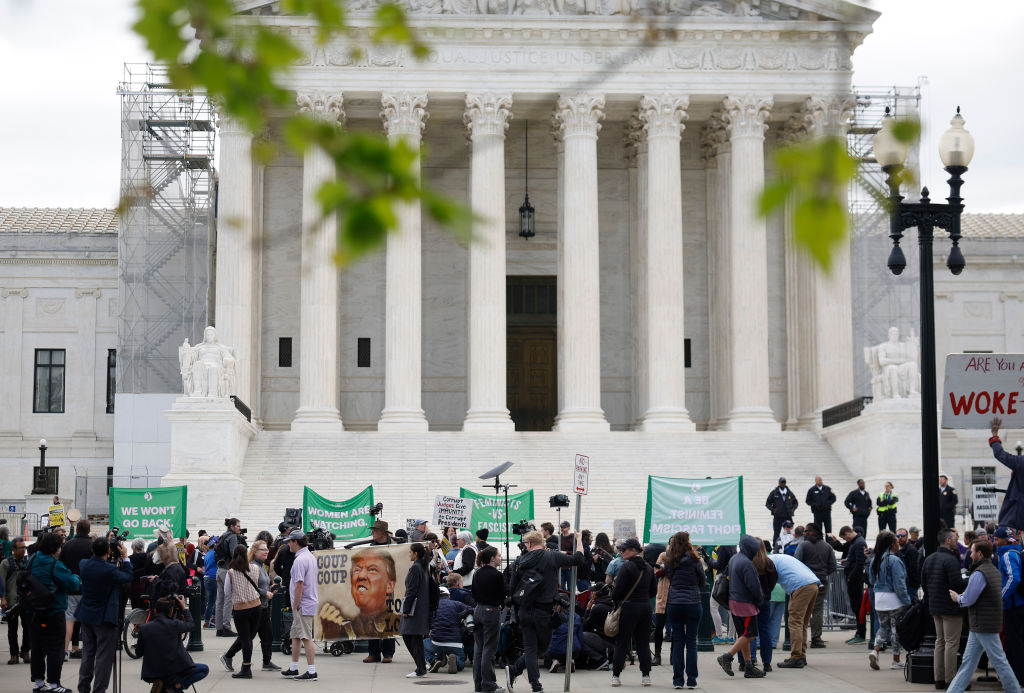Editor’s Note: There was too much legal news this week to fit into just one newsletter, so we hope you enjoy this bonus edition of The Collision.
Donald Trump had some wins and losses at the Supreme Court on Thursday. And that’s before we even see an opinion.
First, when the D.C. Circuit held categorically that former presidents enjoy no immunity from criminal prosecution for any official acts taken while in office, the Supreme Court had no option but to take the case and further delay Trump’s federal election interference criminal trial. Frankly, the question is just too important—this is what the Supreme Court does, after all—and the lower court’s reasoning flew in the face of the Supreme Court’s decades-old precedent that former presidents have absolute immunity at least from civil lawsuits for official acts. The two-month delay between the lower court’s ruling and Thursday’s arguments put Donald Trump that much closer to Election Day without a federal criminal trial.
In another victory, it’s important to remember that the Supreme Court decides questions, not cases. No matter what the opinion says, the decision will send the case back to the lower court to apply the Supreme Court’s rule to the facts of this case. Another delay. Another win for Trump.
But it wasn’t all good news for Trump. In the nearly three hours that the justices discussed “whether and if so to what extent does a former president enjoy presidential immunity from criminal prosecution for conduct alleged to involve official acts during his tenure in office,” it was clear that nobody thinks Donald Trump is immune from federal prosecution for his actions in the run-up to January 6. Not even his own lawyer.
At the same time, it also seemed almost certain that all of the justices are going to agree that at least some official acts of a former president are immune from prosecution. The question isn’t whether the president is above the law. Everyone agreed—from both sides—that the president is subject to prosecution for all personal acts—just like every other American can be prosecuted for their personal acts. The question is what to do about acts the president takes in his official capacity.
But what are official acts, how do we define them, and what should be the test moving forward?
Should judges try to determine whether the president was invoking a core presidential authority—something only a president could do? If the president orders the military to stage a coup or sells our nuclear secrets, those are things only a president could do and they seem like things we might want to prosecute someone for.
Perhaps trial courts could try to determine whether the president’s actions were for the public good (like killing terrorists who turned out to be American citizens) or private gain (like trying to help one’s own chances of reelection by lying about the true effects of a policy)? But if political advantage is evidence of an improper purpose, doesn’t the exception swallow the rule and every president is back to being charged with crimes after leaving office?
Should presidents be immune if their attorneys general told them it was legal and they relied on that advice? That would just incentivize presidents to appoint unscrupulous attorneys general or fill their AG’s time with perfunctory sign-offs for every single thing the president ever does.
If presidents pardon themselves before they leave office, are they immune? But if self-pardons are constitutional, then won’t every president sign one the day before they leave office and Trump is just the last chump who didn’t?
If it’s so clear that presidents can be charged for crimes in office, why wasn’t FDR charged for interning Japanese Americans during World War II—a clear violation of 18 U.S.C. § 242, which makes it a crime for an official to deprive someone of their civil rights?
But if the Founders intended presidents to be immune from prosecution, why didn’t they just say so, as several states did and as some of the constitutional debates even mention? Isn’t that evidence that they had every intention of allowing presidents to be charged?
If the Constitution says that a person who is impeached and convicted “shall nevertheless be liable and subject to Indictment, Trial, Judgment and Punishment, according to Law,” clearly presidents can be charged with some crimes. But does that mean that a former president can be charged only if he’s first impeached and convicted?
As several of the justices pointed out, they aren’t making a rule for Donald Trump. They’re making “a rule for the ages,” as Justice Neil Gorsuch put it—one that has to apply to good presidents and bad ones, Republicans and Democrats, high-minded prosecutors and partisan ones. It can be easy to focus on “the needs of the moment,” as Justice Brett Kavanaugh said.
And here’s the fear. If the high court gives presidents too much immunity, the White House could turn into a “crime center,” as Justice Ketanji Brown Jackson said. Too little immunity, and there’s an endless cycle of prosecutions. The ability to find some vague statute will “be used against the current president or the next president,” Kavanaugh said, “and the next president and the next president after that.”
So how will this all shake out? I can’t say for sure, of course. And oral arguments—even a two-hour and 40-minute session—can tell you only so much. But I predict this will be a unanimous ruling instructing the district court to determine which of the charged acts were clearly outside the authority of the president, whether it was an official act or not.
So if it was personal conduct (signing false election fraud allegations in a lawsuit against the Georgia governor), the charge can move forward. If it was official conduct that was plausibly lawful (considering whether to replace the attorney general), then it has to get tossed out.
But if a president orders SEAL Team Six to assassinate a rival, that is official conduct—anytime the president gives a military order he is acting as commander in chief. At the same time, it is so clearly not something a president has the authority to do—any reasonable person holding the office would know it wasn’t legal—that he would not be immune from criminal prosecution.









Please note that we at The Dispatch hold ourselves, our work, and our commenters to a higher standard than other places on the internet. We welcome comments that foster genuine debate or discussion—including comments critical of us or our work—but responses that include ad hominem attacks on fellow Dispatch members or are intended to stoke fear and anger may be moderated.